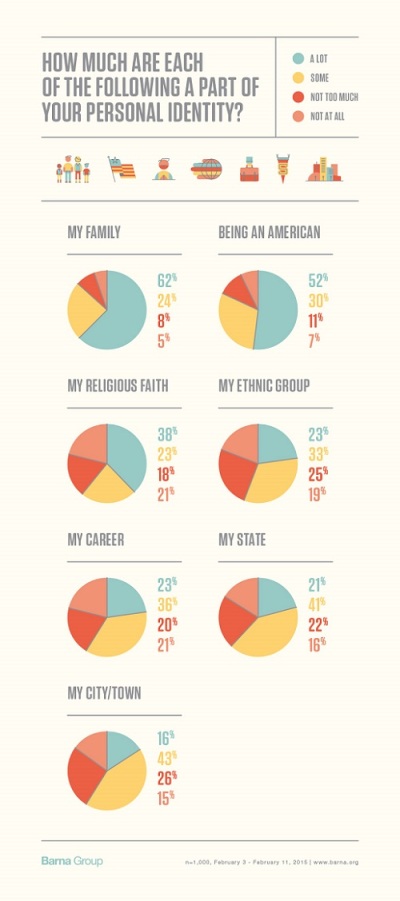'God, country, family' changing in America

VENTURA, Calif. (Christian Examiner) – The Barna Group has released details showing Americans still identify themselves with "God, country and family" but not in that order.
"Nearly two-thirds of Americans say their family makes up 'a lot' of their personal identity," ranking first (62 percent) among the choices in a recent study. "Being an American" was the second-most popular selection (52 percent) and "religious faith" was third (38 percent).
But there were differences on this item among the adults who responded to the survey.
Older Americans, practicing Christians and Midwesterners were more likely "to point to family as a key part of their identity" according to Barna's findings. Millennials, "nones" and people living in the West were less likely to claim family ties as important to describing who they are.
This gap was particularly noticeable between generations.
Nearly three-quarters of those born in 1945 or before strongly identified with their families while only 53 percent of Millennials felt likewise.
The gap widened among these groups regarding feelings about the country.
Eighty percent of older Americans said they tied their identities to the USA, while only 34 percent of those born between 1984 and 2002 had the same feeling.
Religion was a significant component of "self" for 46 percent of those who were 69 years old or more in the study but for only 28 percent of 18-30 year olds.
There was less of a difference regarding the role of religion in personal identity, but only because of the low percentage of elderly who claimed its importance: 46 percent of the oldest adults versus 28 percent of the youngest of legal age.
Barna identified a number of generational events that likely contributed to the differences among age groups including the Watergate crimes, the Vietnam War, globalization, the popularization of MTV, and the Monica Lewinsky scandal.
Other sociologists have pointed to the rapid rise of Internet use, and unprecedented exposure to pornography as key contributors to shaping Millennials.
According to the Barna findings, Millennials and the generation before them, Generation X, "have a reputation for wanting to be individualists—for wanting to break away from traditional cultural narratives and to resist being 'boxed in' by what they perceive as limiting expectations."
But the opinion research company offered these two groups might "begin to gravitate toward their own institutions and grounding narratives" as they aged and experienced the same phases of life changes as the generations before them.